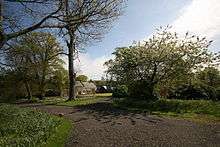Cardross, Argyll

Cardross (Scottish Gaelic: Càrdainn Ros) is a large village with a population of 2,193 (2011)[1] in Scotland, on the north side of the Firth of Clyde, situated halfway between Dumbarton and Helensburgh. Cardross is in the historic geographical county of Dunbartonshire but the modern political local authority of Argyll and Bute. Cardross is also the name of an historic parish where King Robert the Bruce once lived. The Parish area stretched from the west side of Dumbarton to Camus Eskan (near Helensburgh) and even as far as Loch Long and also included the village of Renton in the Vale of Leven.
History
Robert the Bruce purchased the portions of lands of Pillanflatt from the Earl of Lennox, lying in the parish of Cardross in 1326. In 1329, he died at his manorial house that he built there. A field called the Mains of Cardross is thought to have been the location of his royal manor.[2]
Natural History
2 km north-west of Cardross is a peninsula called Ardmore Point. This privately owned area of land has a nature trail and is considered a Regionally Important Geographical Site (RIGS) due to unique rock formations including an exposed sea cliff.[3] It is a popular fishing and bird-spotting area[4][5] and grey seals can also be seen here.[6]
Facilities
Commercial
There are a number of shops, including a post office, newsagents, pharmacy, plumber's merchant and a restaurant, Which has been bought by the shopping branch, The Co - operative, and will soon be the centre shop in the Scottish village. Ardardan Estate[7] is a working farm with a farm shop, plant nursery and tea room and is situated just outside Cardross near Ardmore Point.
Sports
The town possesses a golf course, bowling, tennis and football clubs. Paul Lawrie won the Scottish Professional Golf Championship which was held at Cardross Golf Course in 1992.[8]
Education
Cardross has its own pre-school and primary school.
Transport
Cardross railway station has direct links to both Glasgow Queen Street and Edinburgh Waverley stations on the North Clyde Line; the station is operated by First ScotRail.
A bus service is provided by First Glasgow.
Tourist attractions
Geilston Garden, a National Trust for Scotland property, is located to the north west of the village. There is also a ruined church, which was mistakenly bombed in World War 2 (thought to be a famous ship yard in clydebank), on the road passing by Cardross from nearby town Dumbarton.
Religion
The village has two places of worship: Cardross Parish Church (Church of Scotland) and a Roman Catholic Church dedicated to Saint Mahew. The original parish church was bombed during the Second World War and its ruins are located next to the former Church of Scotland manse.
Listed Buildings/Structures
There are nearly fifty listed buildings/structures in Cardross, two of which are category A.[9]
Some structures of note:
- The 14th century St. Mahew's Chapel. Most recently restored in the 1950s as a Catholic church which remains in use.[10]
- The former St. Peter's Seminary, designed by Gillespie, Kidd & Coia, is situated to the north of the village; it is closed to the public. Abandoned in the late 1980s, it is in a state of dilapidation, particularly internally. Its future is uncertain.[11]
- The ruined 15th-century Kilmahew Castle that was built by the Napier Clan is situated just north of the village.
- The main road through the village goes over Moore's Bridge(1688).
Famous residents
A. J. Cronin, the celebrated doctor and writer, was born in Cardross in 1896.
The BBC sports presenter Hazel Irvine lived in Cardross and attended Hermitage Academy in nearby Helensburgh.
Rev Adam Mitchell Hunter was minister of the parish church from 1897 to 1922.[12]
References
Notes
- ↑ http://www.citypopulation.de/php/uk-scotland.php?cityid=052001
- ↑ Strathleven Artizans: Robert the Bruce King of Scots
- ↑ The Geology of Ardmore Point
- ↑ https://www.google.com/#sclient=psy&hl=en&source=hp&q=fishing+ardmore+point&aq=f&aqi=g-v1&aql=&oq=&pbx=1&bav=on.2,or.r_gc.r_pw.&fp=3788568279b141cc&biw=1280&bih=665
- ↑ "Clydebirds". Clydebirds. Archived from the original on 2012-01-27. Retrieved 2011-11-03.
- ↑ "Ardmore Point, near Helensburgh". Walkhighlands. Retrieved 2011-11-03.
- ↑ Ardardan Estate: Welcome to Ardardan
- ↑ Cardross Golf Club Web Site
- ↑ List of listed buildings in Cardross, Argyll and Bute
- ↑ http://www.stmahew.rcglasgow.org.uk/ourchurch
- ↑ Historic Scotland's Statement of Significance for St. Peter's
- ↑ BIOGRAPHICAL INDEX OF FORMER FELLOWS OF THE ROYAL SOCIETY OF EDINBURGH 1783 – 2002 (PDF). The Royal Society of Edinburgh. July 2006. ISBN 0 902 198 84 X.
Sources
- "Ardardan Estate: Welcome to Ardardan". Retrieved 31 December 2010.
- "Strathleven Artizans: Cardross". Archived from the original on 20 January 2011. Retrieved 31 December 2010.
- "Area Profile of 46 Ward Cardross (Argyll and Bute 2001 Census Factsheets)". Archived from the original on 2007-09-28.
- "The Geology of Ardmore Point" (PDF). Archived from the original (PDF) on 9 June 2011. Retrieved 31 December 2010.
- "Strathleven Artizans: Robert the Bruce King of Scots". Archived from the original on 11 November 2010. Retrieved 31 December 2010.
- "Hermitage Academy web page". Archived from the original on 2007-10-10.
- "Cardross Golf Club". Archived from the original on 2008-05-11.
- "Historic Scotland's Statement of Significance for St. Peter's" (PDF). Retrieved 31 December 2010.
| Wikimedia Commons has media related to Cardross. |
Coordinates: 55°58′N 4°38′W / 55.967°N 4.633°W